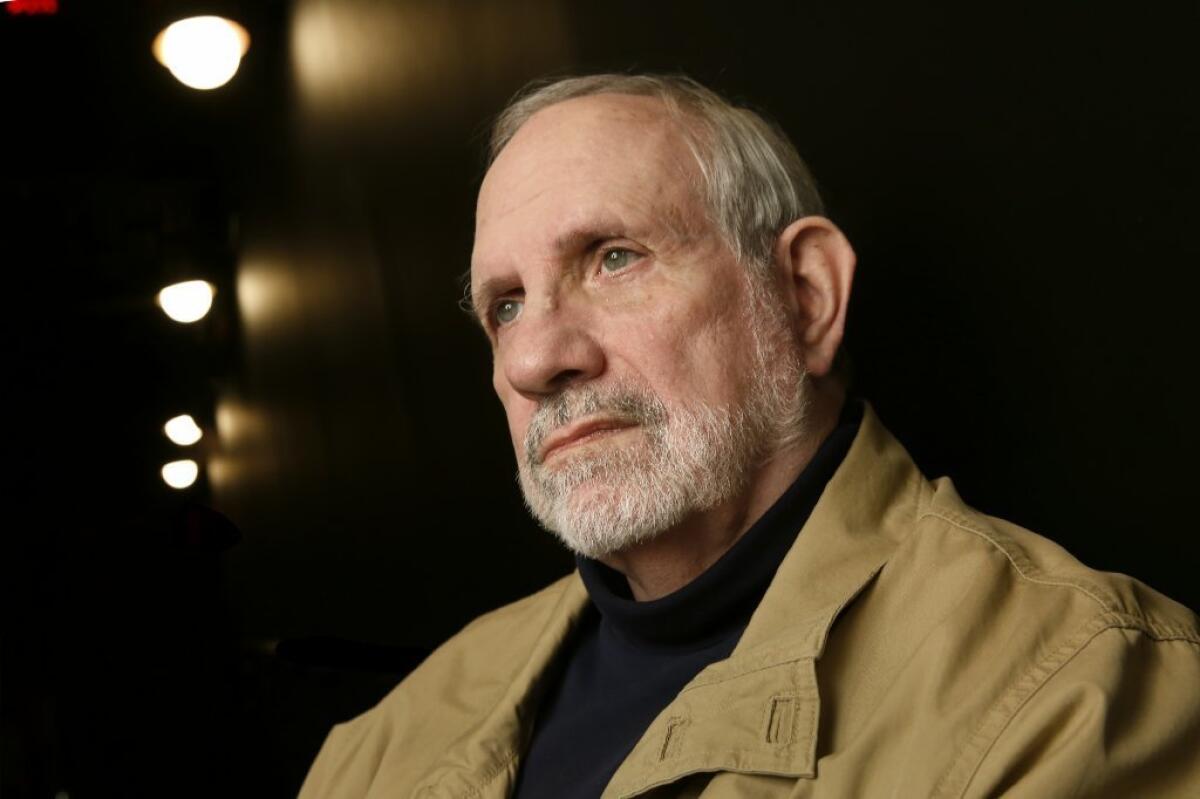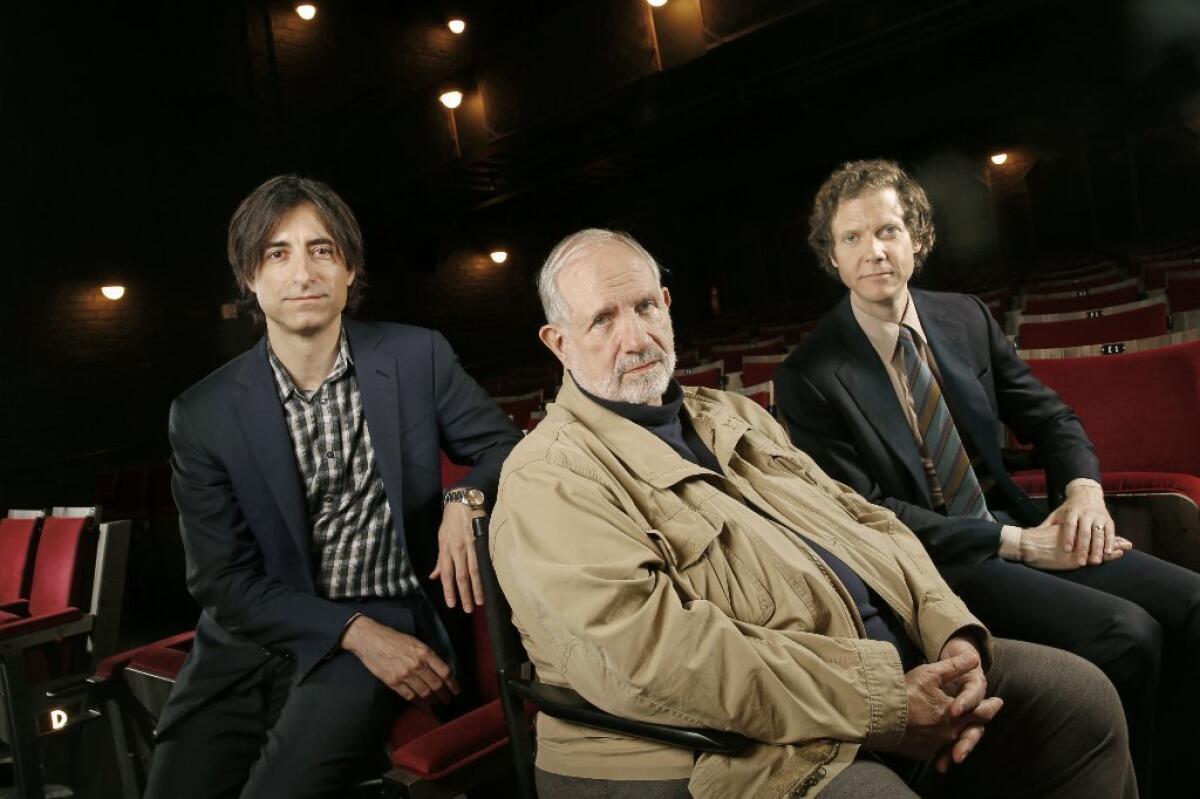Looking back on a career of pulp transcendence with director Brian De Palma

From his movies — controversial spasms of sex and violence such as “Carrie,” “Blow Out” “Scarface,” “Body Double” and “Femme Fatale” and high-style mainstream entertainments like “The Untouchables” and the first “Mission: Impossible” — one would expect filmmaker Brain De Palma to be stormy and intense.
Yet the figure who emerges from the new documentary “De Palma” is warm and open, as insightful about his own movies and failings as he is an extraordinary student of cinema itself. The film, directed by Noah Baumbach and Jake Paltrow, is part master-class, part after-dinner conversation. With a direct simplicity, it features De Palma talking his way through his filmography, with photos and film clips to illustrate along the way.
The documentary had its basis in the friendship between the two younger filmmakers and De Palma, and their chats over coffee or across dinner tables about the travails of moviemaking. Paltrow (“Young Ones”) and Baumbach (“While We’re Young”) recognized that the De Palma they had come to respect and feel a closeness with was not the mercurial person they each initially had expected to meet. In some sense they wanted to document De Palma’s own take on his career and create a way to share with other people the person they had come to know.
“He’s sort of an elemental filmmaker for both of us,” said Paltrow. “Speaking for me, Brian is one of the few filmmakers that I see movies through the way he sees movies. So when I became friends with him, you’re coming to it as such a fan, but then you’ve met someone who is very down to earth.”
Said Baumbach: “I think there are many other filmmakers where we at least have a sense of their public persona and then we can maybe guess or hope that’s also what they’re like in person. But I think with Brian a lot of that is not so well-documented and he’s not as familiar as a personality to people.”
.
De Palma shows incredible candor in the film, both regarding actors and situations he found difficult — one may never think of Cliff Robertson, who starred in De Palma’s 1976 film “Obsession,” the same way again — but also with equal rigor for himself. In a sense it recalls how De Palma allowed journalist Julie Salamon complete access during production of his film “The Bonfire of the Vanities,” which turned out to be a notorious disaster.
“I just think if you’re going to do it, you’ve got to be as honest as possible,” De Palma said during a recent phone call from New York. “I’ve always been very much of a realist about my career and what I can get done and what I can’t get done.”
The documentary — shot over one week in 2010 in the living room of Paltrow’s New York City apartment, with Paltrow operating the camera and Baumbach monitoring the sound — also shows how De Palma’s career has moved in parallel with changes in the movie business, and so the film is also a front-line report of an ever-evolving industry. Baumbach noted how this become clear as he and Paltrow were editing the film, hearing De Palma’s stories in chronological order as he moved from his early independent films to smaller studio movies to larger-scaled international productions.
From early in his career, De Palma has been associated with filmmakers who were also coming up at the same time, notably Steven Spielberg, George Lucas, Francis Ford Coppola and Martin Scorsese. (A funny piece of footage in the movie shows Spielberg calling De Palma from an early car phone.) Perhaps nothing signifies De Palma as the perennial outsider quite like the fact his erstwhile colleagues have all received Oscars while De Palma has never even been nominated.
“We all approached our careers in different ways,” said De Palma. “Francis and George and Steven basically wanted to re-create the studio system, in their own way. And Marty and I were sort of struggling on the outside because we were drawn to such dark, violent material.”
Yet even when De Palma found commercial success on a film such as 1996’s “Mission: Impossible,” his own relentless, restless creative vision wouldn’t allow him to repeat himself. So even though his “Mission: Impossible” may have set the template for the now long-running franchise stewarded by star Tom Cruise, De Palma never went back.
“I didn’t want to make the same movie 15 times,” De Palma said. “And when Tom asked me to work on the next one, I said, ‘Are you kidding; who wants to makes another one of those things?’ Aesthetically there is nothing interesting about it to me anymore.”
It was those sorts of open, self-examined responses that Paltrow and Baumbach were hoping to capture.
“He’s talking about all of these things in a nonpolitical, unguarded way,” said Paltrow. “So he’s talking about the way he makes movies, about things that he is good at, the times when talent meets luck and then also the failures. And how you move past them. Noah often says it’s also a great example of how to have a long career.”

De Palma didn’t hesitate when they asked him to participate in the project. “I wasn’t sure if he would be up for doing it so formally,” said Baumbach. “And what was great about it was as soon as we began he was 100% committed. He was very loose and open, the camera didn’t bother him and he also took it very seriously.”
For De Palma, 75, the film “De Palma” serves as both an overview of his career and as something of a primer on a life in moviemaking, showing a transparency that is refreshing from such a high-profile figure.
“I hope that, much like the book [‘The Devil’s Candy’] about ‘Bonfire of the Vanities,’ you just have an honest portrayal of what the process is like, you don’t pull any punches, you say exactly what happened,” De Palma said. “That’s the only way to convey to young audiences or people interested in movies how the system works.
“As you know, film journalism is mostly spin. You talk to people, they say the experience was great, I love working with so and so, it’s the best experience I ever had. And not until you’re in the Hollywood old-age home do you have anybody tell you the truth.”
Follow on Twitter: @IndieFocus
More to Read
Only good movies
Get the Indie Focus newsletter, Mark Olsen's weekly guide to the world of cinema.
You may occasionally receive promotional content from the Los Angeles Times.











